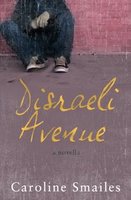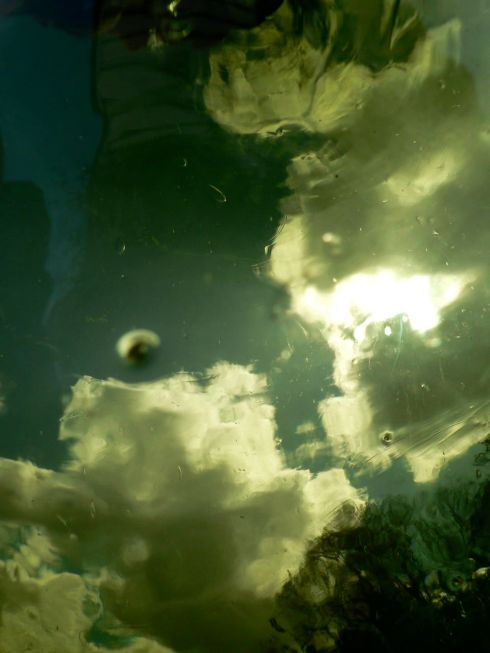You are currently browsing the tag archive for the ‘Caroline Smailes’ tag.
Tag Archive
Biding time
August 20, 2008 in books, crying, E, R, reviews | Tags: Caroline Smailes, Engleby, In Search of Adam, Noughts and Crosses, Siobhan Dowd, Sue Guiney, Tangled Roots, The Book Thief, The Gathering, The Life of David Debrizzi, Valerie | 2 comments
Am waiting for hugely better photos than I took to wend their way from my brother-in-law before embarking on Italy and related subjects, so will meanwhile say what I’ve read the last few weeks:
1) The Book Thief (Marcus Zusak): at Valerie’s suggestion (or rather, insistence!). I fell right into this book, almost against my will, and found the narrator unusual and compelling. Liesel was a superb character, and Rudy, and Max and Papa especially. They were full of depth, colour and breadth immediately. It’s quite a feat I think to maintain strong character and nearly omniscient narration; one is often sacrificed for the other. It was a journey. I loved the visual aspect of the book, and its typography too, and more than anything feel real relief that such an unusual book, with so many different components, can meet with real success. Like probably everyone else in the whole world, I wept all the way through the last 50 pages. I then passed it onto my sister-in-law. I could tell when she reached the same part, from her sniffing on the sunbed next to me…I was oddly disappointed by the ending, though, the very ending, as in the last couple of lines. They felt flat. Sorry to be so picky.
The Book Thief (Marcus Zusak): at Valerie’s suggestion (or rather, insistence!). I fell right into this book, almost against my will, and found the narrator unusual and compelling. Liesel was a superb character, and Rudy, and Max and Papa especially. They were full of depth, colour and breadth immediately. It’s quite a feat I think to maintain strong character and nearly omniscient narration; one is often sacrificed for the other. It was a journey. I loved the visual aspect of the book, and its typography too, and more than anything feel real relief that such an unusual book, with so many different components, can meet with real success. Like probably everyone else in the whole world, I wept all the way through the last 50 pages. I then passed it onto my sister-in-law. I could tell when she reached the same part, from her sniffing on the sunbed next to me…I was oddly disappointed by the ending, though, the very ending, as in the last couple of lines. They felt flat. Sorry to be so picky.
2) The Gathering (Anne Enright): Booker prize winner last year. I liked it alot. Can’t say that I loved it, but I thought it very well written, extremely so, subtle, enticing, troubled and troubling. The narrator here is very particular, specific first person, and the play with time and memory was very, very effective. However: once again I found myself dissatisfied with the ending. I felt that it didn’t quite hold up to the writing. The book was actually about elusive things, so it is no surprise that much of the book felt elusive… Yet, yet… I’d be curious to know what others think. I wonder if it never really, really got down to brass tacks? The constant veering away from subject by the narrator made the book feel veering away? Maybe. However, I am delighted that for once a rather slim volume, with a limited framework and canvas, made it to the Booker table. As a general rule, ‘limited canvas’ books are my favourites — and not the British public’s or Booker judges’. With John Banfield’s book two (?) years ago, room for variation seems to have started with the Booker, for which I am relieved….
The Gathering (Anne Enright): Booker prize winner last year. I liked it alot. Can’t say that I loved it, but I thought it very well written, extremely so, subtle, enticing, troubled and troubling. The narrator here is very particular, specific first person, and the play with time and memory was very, very effective. However: once again I found myself dissatisfied with the ending. I felt that it didn’t quite hold up to the writing. The book was actually about elusive things, so it is no surprise that much of the book felt elusive… Yet, yet… I’d be curious to know what others think. I wonder if it never really, really got down to brass tacks? The constant veering away from subject by the narrator made the book feel veering away? Maybe. However, I am delighted that for once a rather slim volume, with a limited framework and canvas, made it to the Booker table. As a general rule, ‘limited canvas’ books are my favourites — and not the British public’s or Booker judges’. With John Banfield’s book two (?) years ago, room for variation seems to have started with the Booker, for which I am relieved….
3) Engleby (Sebastian Faulks): well, a different order of book I thought. Almost French somehow, in its methodology. There is a fundamental mystery here, but the book is not a mystery book. There is a oddball character here, but the book is not about that either. Somehow. Somehow — despite flagging a little, the narrative loosening in tension to the point of near collapse in the middle — the book becomes about how certain minds work at the edges of certain worlds, certain points of extremis that few if any of us know or understand. Yet the character, caught in this, being this, is also compelling, human, and strangely sympathetic. The book achieves this balancing act through near technical acrobatics I thought. I can’t give it away, but suffice to say that once a certain aspect of its creation is revealed — the whole endeavour takes on a completely different and more complex and gripping quality and motive. It’s impressive. It’s also funny — very dry, ‘smart’, almost cringingly so — throughout. And unlike the previous two books, the rather anti-climactic ending didn’t bother me. Where the other books I think are despite possible intentions dependent upon the narrative — Engleby isn’t. So I didn’t feel its lack in the final pages.
Engleby (Sebastian Faulks): well, a different order of book I thought. Almost French somehow, in its methodology. There is a fundamental mystery here, but the book is not a mystery book. There is a oddball character here, but the book is not about that either. Somehow. Somehow — despite flagging a little, the narrative loosening in tension to the point of near collapse in the middle — the book becomes about how certain minds work at the edges of certain worlds, certain points of extremis that few if any of us know or understand. Yet the character, caught in this, being this, is also compelling, human, and strangely sympathetic. The book achieves this balancing act through near technical acrobatics I thought. I can’t give it away, but suffice to say that once a certain aspect of its creation is revealed — the whole endeavour takes on a completely different and more complex and gripping quality and motive. It’s impressive. It’s also funny — very dry, ‘smart’, almost cringingly so — throughout. And unlike the previous two books, the rather anti-climactic ending didn’t bother me. Where the other books I think are despite possible intentions dependent upon the narrative — Engleby isn’t. So I didn’t feel its lack in the final pages.
4) Noughts and Crosses (Majorie Blackman): young adult book passed to me by E, who read it for eight hours straight, barely stopping to eat. This again was quite compelling reading, though for different reasons. Its premise is one of the world being ‘reversed’ in discrimination, e.g. people of colour being powerful (‘crosses’) and white people being powerless (‘noughts’). It’s a star-crossed lover tale at heart, with politics, money, parenting and growing up thrown into the pot. The interesting aspect of the book is that the characters’ X or O status is rarely pointed up: there are few physical descriptions, and the world is close enough to ours such that as a white reader I had to remind myself many times of the ‘reversal’ of this imagined world. I was mortified and chastened time and again to realise that in my head I always imagined the people with power to be white — and the people without power to be black. Of course, I am liberal enough to know and think I understand that we are all complicit in our society’s racism. However, I have never read anything that so effectively brought me face to face with my own paradigms. The writing itself I felt was inconsistent — some wonderful moments, but also some rather weak ones (lots of adverbs, point of view slippages etc). Plot-wise though I couldn’t fault it. The writer set something up and followed it through, even if we didn’t want to see it…
Noughts and Crosses (Majorie Blackman): young adult book passed to me by E, who read it for eight hours straight, barely stopping to eat. This again was quite compelling reading, though for different reasons. Its premise is one of the world being ‘reversed’ in discrimination, e.g. people of colour being powerful (‘crosses’) and white people being powerless (‘noughts’). It’s a star-crossed lover tale at heart, with politics, money, parenting and growing up thrown into the pot. The interesting aspect of the book is that the characters’ X or O status is rarely pointed up: there are few physical descriptions, and the world is close enough to ours such that as a white reader I had to remind myself many times of the ‘reversal’ of this imagined world. I was mortified and chastened time and again to realise that in my head I always imagined the people with power to be white — and the people without power to be black. Of course, I am liberal enough to know and think I understand that we are all complicit in our society’s racism. However, I have never read anything that so effectively brought me face to face with my own paradigms. The writing itself I felt was inconsistent — some wonderful moments, but also some rather weak ones (lots of adverbs, point of view slippages etc). Plot-wise though I couldn’t fault it. The writer set something up and followed it through, even if we didn’t want to see it…
*
Of course the reading pile has no end. And much of what I read on holiday was just that — good holiday reading. I find that I am always trying to balance ‘keeping up’ with ‘reading off-centre’. Holiday time is where I do the former.
I’m now reading one of R’s books, given to him by student, and one he read on holiday: The Life of David Debrizzi (Paul Micou). So far, it’s frankly hilarious.
And I’m desperate to read Sue Guiney’s Tangled Roots. And a writer E is now reading, who I think is just superb from my snatched evening reads to him: Siobhan Dowd (Bog Child and The London Eye Mystery). AND I read Caroline Smailes’ In Search of Adam some time ago and still haven’t reviewed it here! Not fair! I WILL.
Friends, family and children
May 19, 2008 in cats, crying, E, images, M, R | Tags: Alis Hawkins, Andrew McGuinness, Caroline Smailes, children, Deborah Rey, E, friends, hard to grow flowers in a storm, Helena, Janice M, Jeremy Scott, Lynne Rees, M, Mom, Nancy, Nancy Wilson, R, Sarah L, Sarah P, solid ground, Susan Wicks, Tilly, truthoughts | 6 comments
It’s been a tough old week. After Tilly, a number of things. But it’s also been life-affirming in many ways. Mainly because of friends. And R and Mom. And E and M.
I came to friends late in life, having the ‘desert them before they desert me’ mentality of someone used to not trusting anyone. For good reason, I might add.
Anyway. Despite several wonderfully loyal and giving friends hanging with me through my teens, twenties and most of my thirties, it wasn’t until my late thirties that I finally stopped running. I looked around. I saw wonderful women (mostly) around me, offering friendship, true friendship. Most of them had been there for some time. I have the feeling somehow they just decided not to give up on me. For which I remain absurdly grateful. Such a simple thing.
I have a thing about not taking anything for granted. Seems almost disrespectful to do so. Yet some things are meant to be taken for granted. They flourish by being as a ‘matter of course’; they quietly sink roots beyond the surface, where wind and a heavy rain can’t dislodge them. They need tending, but only in the daily run of things, no more, no less. They are there, no matter what happens.
No matter what happens! No matter what happens. This is the secret celebration for me, the unexpected. It’s no big deal, no drama. No questions need to be asked, no unspoken price.
Two phonecalls, three texts, many blog comments. Several emails. Four, five, six face to face conversations. A raucous dinner.
So, to all of you, thank you. I’m not looking forward to the week ahead, but — cliche upon cliche — you’re making it bearable.
I started this post wanting to point you to my good friend Nancy Wilson‘s Flickr widget that I’m so thrilled with. I love her stuff, really love it. I just wanted a bit of her kind of light on these pages.
To get you started. And me. Happy Monday.
Gifts
February 17, 2008 in books, reviews | Tags: adult victims of abuse, blowing bubbles, Caroline Smailes, Disraeli Avenue, gift-giving, gifts, In Search of Adam, Losing You, soft landings, Your Messages | 2 comments
I’ve been thinking a lot about these the last few days. For a number of reasons. It’s just that there are so many different types. And I seem to be awash in them, with them. The acceptance of a gift brings responsibility. And openness. The giving of one, in the best world, means letting go. And a sort of hope.
There must be a small but determined fleet of these gift bubbles — I can’t help but see them as such, blown from one of those plastic child bottles, in surprising and joyful profusion — taking to the air over our double-glazed lives. This morning there’s a hard frost, but the urge to strike out and join them is almost overwhelming.
First there was Your Messages. Now there is Disraeli Avenue, by Caroline Smailes. I met Caroline at the Your Messages launch. But sort of knew her already, as she’d kindly reviewed Losing You.
She was lovely. I liked her piece. I’m embarrassed to admit that I haven’t read her novel In Search of Adam yet (because I’m not the best in the world at doing exactly what I want when I want, believe it or not; hand on heart though it is actually right at the top of my list).
 About Disraeli Avenue: a novella by Caroline, downloadable, by donation. In support of adult victims of sexual abuse. Remember openness? Remember hope? Some days that’s all there is. When the bubbles disintegrate, we’ve got to make sure there are decent landings. Get this book. And give generously.
About Disraeli Avenue: a novella by Caroline, downloadable, by donation. In support of adult victims of sexual abuse. Remember openness? Remember hope? Some days that’s all there is. When the bubbles disintegrate, we’ve got to make sure there are decent landings. Get this book. And give generously.
Nice surprise
December 4, 2007 in bluechrome, reviews, Uncategorized | Tags: bluechrome, Caroline Smailes, Losing You, review | 2 comments
AGAIN!
Amongst the emboldened messages lined up like little soldiers yesterday I discovered a gem: another wonderful review. This time from (astute) Caroline Smailes, on what has got to be one of the most enticingly-titled blogs ever: What You Reading Caroline?
Here’s a taste:
A short read-in-one-sitting novel told in two parts, in two lyrical voices. A sparse yet precise piece of fiction that forces the reader to think about invisible words, about all that is left unsaid.
The story centres around the time just before and after Marilyn’s father’s death and is perhaps a study of the assumed within relationships…There is an eeriness, a darkness that comes from the invisible words, from the unspoken.
Crafted, skilfully paced and visual through familiarity…There are unanswered questions that the reader will never have responses to…I loved the layout and feel of this book. A beautiful object that added to the pleasure of the read.
What a treat! She’s also taken the trouble to put the review on amazon, for which I am grateful.
And I’m delighted to see once again some appreciation for the care bluechrome take with their books. Hear, hear! There’s none of this flimsy almost transparent paper, invisible margins, dense text and bendy covers malarky — no sir-ee Bob. If you’re going to do it, do it right. And they do. bluechrome books are a joy to (be)hold.



